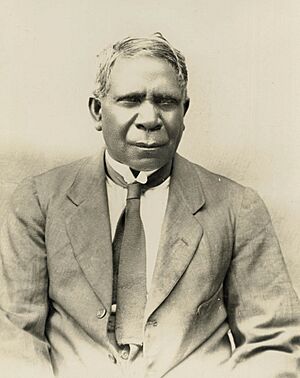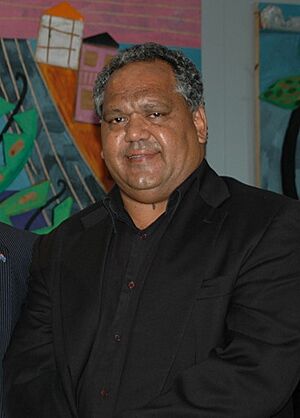Indigenous Australian literature facts for kids

Indigenous Australian literature includes all the stories, plays, poems, and other writings by Aboriginal and Torres Strait Islander people in Australia. These works share their unique cultures, histories, and experiences.
The first known writing in English by an Aboriginal person was a letter by Bennelong in 1796. However, David Unaipon was the first Aboriginal author to have his work published, back in 1924–1925. Since then, many more Indigenous authors have been published and recognised. By 2020, a project called BlackWords listed over 23,000 works and nearly 7,000 authors and groups. Most of these writings are in English, because Indigenous Australians did not use a written form for their languages before Europeans arrived. Now, with efforts to bring back traditional languages, more works are expected to be written in Australian Aboriginal languages.
Contents
A Look at the Past: History of Indigenous Writing
Before Europeans came to Australia, Indigenous Australians did not have a writing system. So, the first stories about Aboriginal people were written by early European explorers in their journals. These journals described their first meetings with Indigenous people.
The very first known writing in English by an Aboriginal person was a letter. It was written by Bennelong to Governor Arthur Phillip in 1796.
First Published Aboriginal Author
David Unaipon (1872–1967) was the first Aboriginal author to have his work published. He wrote Legendary Tales of the Australian Aborigines in 1924–1925. This book shared traditional Aboriginal stories from an Indigenous perspective.
Important Moments in Indigenous Literature
In 1963, the Yirrkala bark petitions were created. These were important traditional Aboriginal documents. They were officially recognised by the Australian Parliament.
Oodgeroo Noonuccal (1920–1993) was a famous Aboriginal poet and activist. She published the first book of poems by an Aboriginal person, called We Are Going, in 1964.
From the 1970s to the 1990s, there was a big growth in Aboriginal literature. This was a time when many people were fighting for Indigenous land rights. Sally Morgan's book My Place (1987) helped many people learn about Indigenous stories. In the same year, Magabala Books, an Indigenous-owned publisher, released its first book. In 1988, the David Unaipon Award was created. This award helps new Aboriginal and Torres Strait Islander writers.
Later, from 1996 to 2007, there was a period when fewer Aboriginal books were published. But this changed in the mid-2010s.
Modern Indigenous Literature: Today's Voices

Wiradjuri writer Anita Heiss has put together a collection of Aboriginal literature. It covers writings from 1796 all the way to 2008. She also wrote a guide for Aboriginal and Torres Strait Islander writers.
Important Aboriginal leaders like Marcia Langton and Noel Pearson have also written non-fiction books and essays. Other well-known Indigenous writers include the playwright Jack Davis and Kevin Gilbert.
In 2013, the First Nations Australia Writers Network was started. Its goal is to support and speak up for Indigenous writers. Writers like Anita Heiss, Sandra Phillips, and Jeanine Leane have been very important in promoting Aboriginal publishing in the 21st century.
Award-Winning Authors
Many Indigenous authors have become very well known in the 21st century. These include Kim Scott, Alexis Wright, Kate Howarth, Tara June Winch, Yvette Holt, and Anita Heiss.
Some Indigenous authors have won Australia's top literary award, the Miles Franklin Award.
- Kim Scott won in 2000 for Benang and again in 2011 for That Deadman Dance.
- Alexis Wright won in 2007 for her novel Carpentaria.
- Melissa Lucashenko won in 2019 for her novel Too Much Lip.
Indigenous women writers have also been recognised with the Stella Prize. This award celebrates writing by Australian women.
- Alexis Wright won the Stella Prize in 2018 for her book Tracker.
- Other Indigenous authors shortlisted for the Stella Prize include Melissa Lucashenko (2019), Claire G. Coleman (2018), and Ellen van Neerven (2015 and 2014).
Poetry: Powerful Words
In 2020, poets like Evelyn Araluen, Ellen van Neerven, and Alison Whittaker became even more famous. Ellen van Neerven's poetry collection Throat won several awards, including Book of the Year, at the NSW Premier's Literary Awards. Gunai poet Kirli Saunders looks up to van Neerven, Ali Cobby Eckermann, and Oodgeroo Noonuccal as major influences. Evelyn Araluen's book Dropbear won the 2022 Stella Prize.
Online Places to Find Indigenous Literature
- AustLit's BlackWords project lists many Aboriginal and Torres Strait Islander writers and storytellers from the past and present.
- The Living Archive of Aboriginal Languages has works written in traditional languages from the Northern Territory.
Notable Authors
See also
 | Sharif Bey |
 | Hale Woodruff |
 | Richmond Barthé |
 | Purvis Young |

